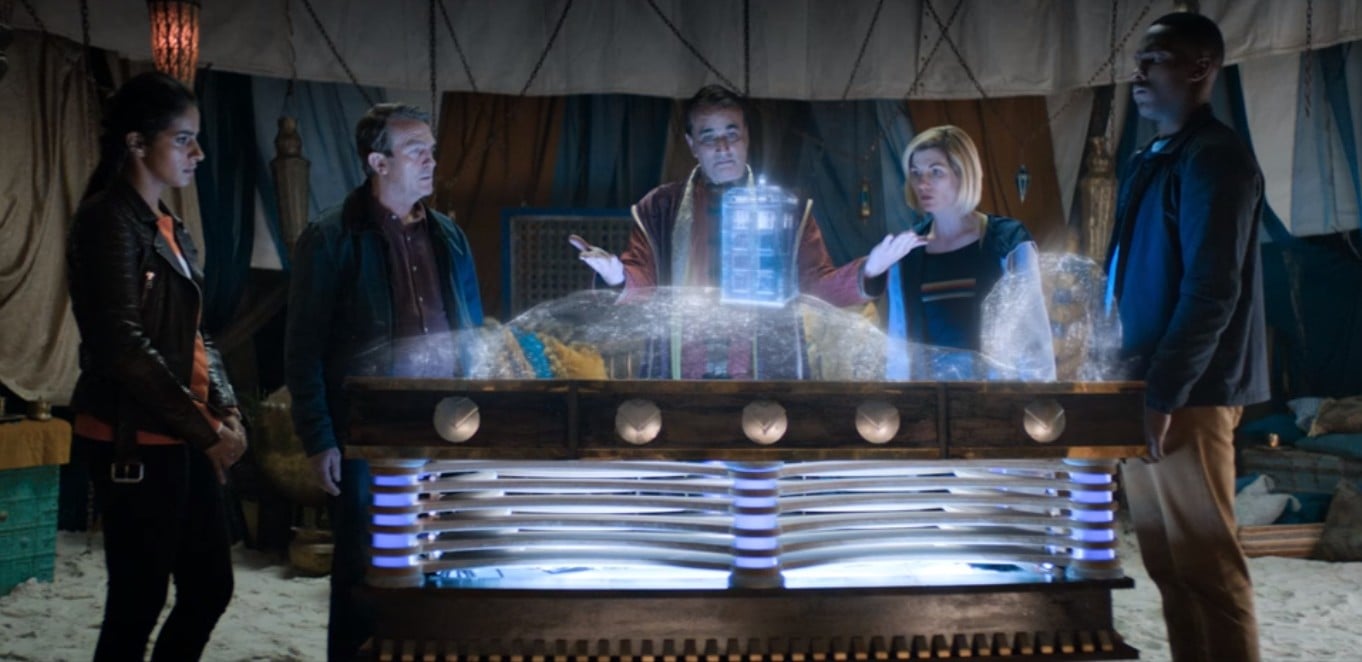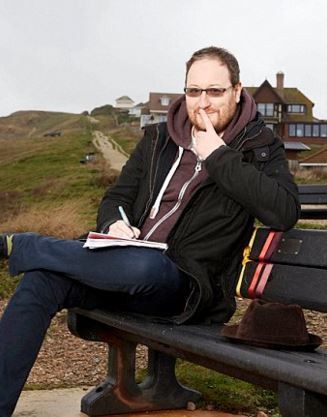
After what often seemed like the longest year ever, the new season of ‘Doctor Who‘ is finally underway! It’s a big year for the show, in more ways than one. Not only do we get a new showrunner in the form of Chris Chibnall, but he’s also brought with him a new Doctor (and the first female Doctor at that!), three new companions, and a revamped look and feel for the long-running program. On the Sunday of New York Comic Con, mere hours before the premiere simulcast of ‘The Woman Who Fell to Earth’, we had the chance to speak with both Chibnall and producer Matt Strevens about populating the TARDIS, their goals for the season, the power of fan reactions, and more!
When you came in and were laying the groundwork for the new season, what was the first thing you wanted to do, sort of your first goal in crafting this?
CC: Don’t break it. Because it’s awesome.
MS: That’s what he said to me.
CC: Because it’s awesome. [laughs] I think what we wanted to do, certainly what I wanted to do coming in was create a series that reflected my love and passion for the show from being a three-year-old to now. And obviously when we knew that we had a new Doctor and it would be Jodie, something that everyone can access, something that feels incredibly inclusive, very, very mainstream, that can recruit… Because you’ve got a new Doctor you’ve got that opportunity that the series has every so often, to go “Alright, the kids who were four when Peter became the Doctor, they’re coming into being eight now. They are prime targets.” And so we wanted to just do a show that demonstrated the whole breadth and range of what ‘Doctor Who’ can do, that would tell stories that resonate with the world we live in now, and that would be incredibly emotional, really. And that felt like it was ‘Doctor Who’, just as every person who’s ever worked on the show – whose shoulders we stand on daily – through history, sort of going “Well, what does ‘Doctor Who’ feel like in 2018?” So we wanted to make a ‘Doctor Who’ that felt like it was connected to the world in 2018, stood alongside ‘Black Mirror’, ‘Game of Thrones’, the CW shows, all that kind of stuff. That was our challenge. So it was not a small challenge that we set ourselves. [laughs] Kind of everything. We wanted to do everything and for it to be really good.
 MS: You can boil it down to two things. The heritage. You want to carry on the heritage and for it to be everything it’s always been. And the other thing you want to do, which is kind of… I suppose is there a dichotomy? I don’t think there is. But you want it to feel freshly minted, like it’s a brand new show. We often said, “If the show had gone away for a long time, if it had been away for five years, what would you want to do with it?” And it is that thing of going on a production side, as well. It has to sit alongside ‘Westworld’, and it has to sit alongside ‘Stranger Things’, and all those things. Because the audience, and the younger audience especially, don’t differentiate, whether they’re watching it on the big screen or on HBO or Netflix, or on BBC. It has to be up there with those guys. It deserves to be. And I think that was a thing, of going “We deserve to make sure this show is as fresh and as cutting edge as we can make it.”
MS: You can boil it down to two things. The heritage. You want to carry on the heritage and for it to be everything it’s always been. And the other thing you want to do, which is kind of… I suppose is there a dichotomy? I don’t think there is. But you want it to feel freshly minted, like it’s a brand new show. We often said, “If the show had gone away for a long time, if it had been away for five years, what would you want to do with it?” And it is that thing of going on a production side, as well. It has to sit alongside ‘Westworld’, and it has to sit alongside ‘Stranger Things’, and all those things. Because the audience, and the younger audience especially, don’t differentiate, whether they’re watching it on the big screen or on HBO or Netflix, or on BBC. It has to be up there with those guys. It deserves to be. And I think that was a thing, of going “We deserve to make sure this show is as fresh and as cutting edge as we can make it.”
Can you tell us a bit about this year’s villains? I know that could get spoilery, but your inspiration behind them, since they’re all new this year?
CC: Yeah, I think, first of all, you’re gonna get monsters of all shapes and sizes. And textures. [laughs] And I think, again, it’s kind of making sure that the stories resonate with the world that we’re in now. So one of the great things about working on the show – and for the writing team we brought on as well – is going “Alright, bring us your monsters!” So I think as much as anything we just wanted a real variety, that they’re surprising, that they’re fun. Some are creepy, some are scary, some are… odd. So again, it’s a bit kind of showcasing what ‘Doctor Who’ can do and feeling for the generation of viewers who are gonna hopefully come on board now, it feels like their monsters, the ones that they can own. You know, that thing again whether you’re a kid of eight or a first time viewer of twenty-eight, or ninety-eight, you go “Oh, okay, that was my monster.” But we’re being very cagey about spoilers, because the story of ‘Doctor Who’, the story of the episode, is “What’s the monster? What do they want? What’s their plan?” And if I tell you now, I’ll ruin episode five for you, and I don’t want to do that.
MS: The biggest fun is seeing how they land with the audience. Because you always think, “Oh that one will really kind of grab people,” and it’s wonderful to see what happens and who takes what monster to their heart or how they react. That’s great. And having ten standalone episodes means we can be really greedy and have lots of monsters and villains, which is a lot of fun.
CC: Because it’s also the best part of the job. We get to make up monsters for a living. Literally amazing. With the amazing trust that we can then bring them to life. And that’s the visual effects or the prosthetics or the designers, it’s like, “That’s great! I didn’t get to do that on ‘Broadchurch’!” [laughs] I kept trying, and they were like, “No.”
Have many female fans expressed to you how they feel about Jodie as the Doctor, and what’s it been like to take all that in?
CC: It’s been really emotional. And obviously, we’ve shown the episode to a very small amount of people so far, and watching it with female fans, watching it with women, is incredibly emotional. And I don’t think we ever underestimated that. I think what we’re gonna do in a couple hours time – you know, we’re gonna be in Madison Square Garden with five thousand close friends watching it. I think it’s going to be one of the most emotional days of our lives. And I think showing this to people who are longtime fans of the show… I’ve never underestimated how potent that would be, and it really is proving to be the case. It’s quite hard to talk about it without getting emotional about it because it feels… I’m married to an awesome woman, I have an amazing sister and an aunt, and we work with brilliant women all through the show. And to see that reaction is… It’s… If I go, “Humbling,’ it sounds ridiculous, but it really feels like it’s a very humbling time to be on the show. It’s a privilege to be kind of curating this through. So I… I don’t have a good soundbite answer to that other than, yes. It’s been very emotional with some of the women I’ve shown it to. There are very iconic moments throughout the first episode. Jodie’s Doctor does some very awesome things in the first episode. Very deliberately with the first female Doctor, she comes in, we haven’t been meek with her. And those moments feel very powerful when you watch them with women.
MS: And I think one of the most moving things for me was when we first started filming. It was in the second block, I think, so we hadn’t been filming very long at all. And so there’d just been an announcement, we’d filmed in Sheffield, and all these mums turned up to the set on location with their daughters. And they asked for photos with Jodie, and she’s always brilliant like that. She’s just lovely. So she’s sort of “Let me come out. I want to come out of my trailer and meet these people.” And it was just women saying thank you to Jodie and going, “The fact that my daughters and my sons can look up to you.” And it went out on social media quite a lot. It was just lots of lovely pictures of people that just turned up on the set and wanted selfies with Jodie with their daughters and going, “This is so hopeful for us. This is great.” So that was really moving as well.
CC: And the final thing on that is that the day after the reveal, after we revealed Jodie’s casting with the video, I was at a university, and I met this group of women who came over and went, “We’re female doctors. We need to have our photo taken with you now! It’s a big day for us.” And it’s that and there was a beautiful thing that BBC America has put out on their social media of lots of female doctors talking about being a doctor and talking about what they’ve been through. So it’s… I hope it just connects and it… yeah. I find it hard to talk about.
Aside from the obvious – new Doctor, new companions, all that – what would you say is the biggest change for this year?
CC: Probably the way it looks. We’ve got new lenses. We’re shooting on anamorphic lenses. We’re in 2:1 aspect ratio. Which a lot of the audience won’t necessarily notice, but I hope we’ve given it a duty of care. You know, everything looks awesome on TV. Everything looks like a movie. Our responsibility was to bring ‘Doctor Who’ up to that. There’s a new composer, which makes a big difference as well. And Segun Akinola has done a great thing. In a sense, we’ve never talked about differences. We’re just going, “What is the purest version of ‘Doctor Who’ for this year, and how do we get everybody to bring their love for the show and passion for the show, an our love for the show and make it into a holistic, new version that people who love the show will hopefully fall in love with this version as well?” I don’t know if that quite answers your question? Nearly. It’ll have to do. [laughs]

How did you develop the companions, and also what made you decide that there should be three this time around?
MS: In a sense, the idea of three companions is going back to the original version of the show. If you want to talk about formats, it was the Doctor and three companions. And very much, the Doctor – though the eponymous character – is set apart. In many ways you, the audience., are the companions. We go through their POV. So the idea of having three companions was to sort of mine as many emotional journeys and POVs as we can. There’s an element we talked about with ‘The Wizard of Oz’, you’ve got a group of people who in some ways don’t yet know what their strengths are, don’t yet know what they can bring, what they’ve got inside. The Doctor makes them realize they had it inside all along, and they just needed to go on this journey. And it also allows for more diverse storytelling. We can go off into different areas, we can split up the team. There’s a gang show element. So just structurally, it allowed Chris and the writers to have a bigger sort of paint box to play with. But it is very much rooting them in the real world. That’s the thing, we wanted these companions to feel real. That you could relate to them. And the magic element, the magical crucible, is the Doctor. But they are people that you know, that you’ve worked with, and that you hang out with and go to school with, and everything else.
CC: And that big a group allows the audience… Hopefully everybody in the audience will find someone within the group and go, “Oh, that’s like me or that’s like my mate,” or whatever. So it’s really making sure everybody’s looked after.
There have been so many different kinds of stories told on the show over the years, from the light-hearted to the scary and the tragic. How do you go about finding a balance between those different types of stories heading into a new season?
CC: The joy of doing a season is to have as broad a range of stories as possible. So hopefully you’ve got some lighter stories, you’ve got some emotional stories, you’ve got some creepy stories, some darker stories. That’s the joy of ‘Doctor Who’, exactly what you describe. And in a sense that was the aim for the season, that as you reach the end you’ve had all those flavors and tones. Within episodes as well, some episodes… the multiplicity of episodes and tones you can do in ‘Doctor Who’ is really exciting, and I think what you’re gonna watch later on today – I presume you’re gonna watch it. I’ll be really annoyed if you don’t! [laughs] – I think hopefully has a big range, takes you through a range of emotions, within even the first episode.
MS: And I can’t add to that! [laughs]
The eleventh season of ‘Doctor Who’ stars Jodie Whittaker, Bradley Walsh, Tosin Cole, and Mandip Gil. New episodes air on Sunday nights at 8pm on BBC America.
